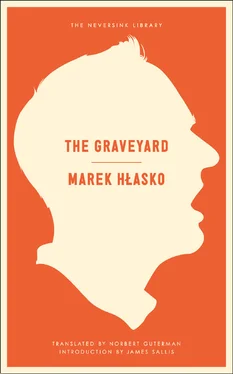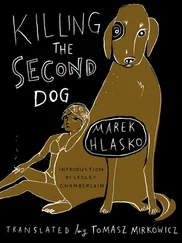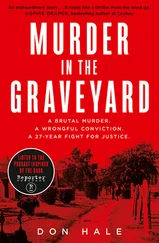“Me?” Franciszek stammered. “Unmasked myself? What is this all about?”
“Maybe you don’t like it here,” the sergeant said. “Tell us: Don’t you like the regime? Or maybe the police?”
The man in plain clothes rose from his seat. His legs wide apart, he looked straight into Franciszek’s eyes. “You have insulted the party,” he said calmly. “You have insulted the uniform of the People’s police. You have insulted the People’s Poland. You abused the party and the People’s government in such language that I’m ashamed to repeat it. All this was taken down verbatim. Do you remember that? You, a party member, as your papers show, you have insulted our government, our People’s regime. By this token you have shown what you really are, Mister Kowalski. Be good enough to read this, and sign it, Mister Kowalski. Then you’ll pay the fine and you’ll go home. We’ll inform the secretary of the party organization. We’ll send him a copy of the record. And now — please.” He handed Franciszek a sheet of paper and a pen.
“My God,” Franciszek stammered, “is it possible?” His knees were trembling, and his heart was pounding somewhere in his throat.
“Pretend that it is,” the lieutenant said. He cast a glance at Franciszek, who was as pale as a sheet, and grinned crookedly. “Stop play-acting,” he said sharply. “You think one thing and you say another. We’re not here to be taken in by such tricks. One day you shout obscenities in the streets; the next day you’ll be a spy. Read this, please, and sign.”
“But I couldn’t possibly have shouted like that!” Franciszek cried. “There’s some mistake. I refuse to believe that I said such things.”
“I heard you,” the sergeant said. “And if you don’t like it, just say so.”
“I don’t think that way.”
“You shouted that way,” said the man in plain clothes. “These are your words. I am ashamed to repeat them, party comrade.”
“What a sober man thinks in his heart a drunk says with his tongue,” the lieutenant said. “Surely no one knows that better than you.”
“A mistake,” Franciszek said hoarsely. He raised his hand to his forehead as though he were going blind. “A mistake.”
“That’s right,” said the man in plain clothes. “You made a mistake. You made a mistake if you thought the enemy can never be unmasked.”
Franciszek glanced at the paper he had been handed. He tried to read it, but the letters blurred before his eyes into a single formless mass. Suddenly he had the feeling that everything around him was unreal, make-believe. He closed his eyes; on opening them after a moment, he saw the lieutenant bending over him. A little farther off stood the man in plain clothes, and next to him, the sergeant. Their faces showed nothing but contempt.
“Here,” the lieutenant said, pointing to the place where he had to sign.
“I—” Franciszek began. He stopped suddenly. He realized that he was at the end of his rope, and that he would not be able to say a word to justify himself before these men. In the corridor someone was banging his fists on the door, roaring, “Let me out! Let me out!” Franciszek thought: “I’ve got to get out of here, get out at any cost.” He picked up the pen, and signed. The lieutenant took the paper from his hands and threw it on the desk.
Later, as they returned his things, he could see the policemen talking to him, but their words were no more distinct than the buzzing of a fly. A void opened within him, and he could not find a single thought to fill it with; he put on his necktie, laced his shoes, and buckled his belt, moving like a sleepwalker. Not until the lieutenant had opened the door did he hear the man in plain clothes say to him, “So long, Mister Kowalski.”
And he found himself in the street.
THE ICY WIND BLOWING FROM THE VISTULA revived him a little; the day was misty and cold, and the pale sun glistening feebly on the damp roofs carried not a hint of spring; no one would have suspected that the sap was already gathering under the bare branches of the trees. He walked fast, straight ahead, his crumpled overcoat unbuttoned; he had no idea where he was going; he was filled with only one desire — to get as far away as possible from the scene of his nocturnal ordeal. “The whole thing is a stupid accident,” he muttered to himself. “It’s perfectly insane. Everything will be cleared up soon; damn it all, it must be cleared up! I’ll settle the matter right away; I’ll go to see whatever person I have to …” He caught the amused glances of the passers-by, and realized that he had been talking to himself; he buttoned his overcoat and slowed his pace.
In the window of a little shop he saw a sign, TELEPHONE. He pushed the door open and entered; the shop bell above the door tinkled shrilly. Out of the darkness came the smell of stale vegetables. A young girl was standing at the telephone; Franciszek moved aside.
“What can I do for you,” asked the proprietor, unshaven, in a dirty smock.
Franciszek pointed to the girl: “I want to use the phone …”
The proprietor gave a grunt of disappointment, and buried his dark face in the newspaper. “We Are Advancing Toward …” a headline screamed. After a moment he turned the page. “Yesterday’s speech caused wide repercussions …” The girl was chirping into the receiver, her lips curving deliciously: “Dzidka? Impossible! Is that so?… It’s true, she always … I don’t want to say anything mean about her, but it’s only what you’d expect …”
The bell above the door tinkled. Franciszek shuddered as though touched by an electric current. A boy came in; his sharp eyes glinted under the visor of his cap. He put a jar on the counter. “Milk and half a pound of butter.”
“… Dzidka? With Romek? Yes, I always …”
“There’s no milk. I have potatoes.”
“… I’ve always said …”
“And the butter?”
“No butter. I’ll have Brussels sprouts this afternoon.”
“I’ll telephone, and the whole thing will be cleared up,” Franciszek thought. He looked resentfully at the girl’s little painted mouth. “I’ll telephone; I’ll go to the factory, and everything will be settled.”
“And lard?”
“No lard, but I have potatoes.”
“… I’ve always said to Stefan, ‘Look out, you can never tell what she might do’ …”
“When will you have butter?”
“How the devil do I know? I told you what there is. Now get out!”
The bell tinkled again, startling Franciszek; the boy walked out. He ran across the street, splashing through a puddle; his shoes were at least three sizes too big for him. “Fool,” thought Franciszek in irritation; “some day he’ll break his leg.” He glanced at his watch: he was already an hour late; he must telephone …
“… you know me, you know I never say bad things about my girl friends; but in this case … What? It isn’t Dzidka? I know it isn’t Dzidka, of course not. But to get back to Wladka …”
He put his hand on her shoulder; she turned around. “Three minutes,” he snapped. “Enough.”
“Can’t you be polite?”
“Can’t you grow up?”
She flung some coins on the counter, and, looking at him with rage, walked out, slamming the door; once again the bell tinkled at the very center of his tired brain. The worn dial swung in its arc like a pendulum. “The Be-Kind-to-Animals Veterinary Home,” said a voice in the receiver. “Sorry, wrong number,” he muttered. In the end he managed to dial the right number; there was a continuous ringing — the busy signal. He hung up and leaned helplessly against the wall.
“She was a fresh little piece,” the proprietor said. “Nowadays the eggs are smarter than the hens. You speak to her politely, and she opens a mouth that — oh, well.” He waved his hand. “I was brought up differently. Once …”
Читать дальше






![Ричард Деминг - Whistle Past the Graveyard [= Give the Girl a Gun]](/books/412176/richard-deming-whistle-past-the-graveyard-give-t-thumb.webp)


